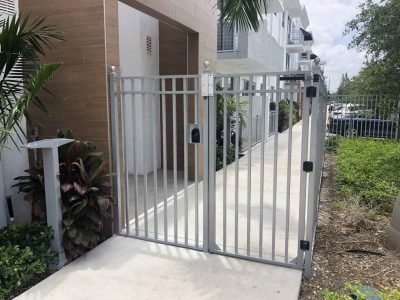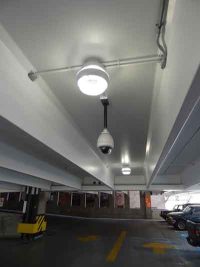Crime Prevention Through Environmental Design (CPTED)
Crime Prevention Through Environmental Design (CPTED) Crime prevention through environmental design (CPTED) has existed since the 1960s but evolved into a design and space management approach in the 1970s. CPTED is the [...]
Coefficient of friction testing
Coefficient of friction testing Coefficient of friction testing measures the ease with which two surfaces in contact can slide past one another, where two different values are associated with the coefficient of friction [...]
Slips, Trips, and Falls. Bad Design or Careless Behavior?
SLIPS, TRIPS AND FALLS: BAD DESIGN OR CARELESS BEHAVIOR? Randy Atlas, Ph.D., AIA, CPP Abstract The paper and presentation address how much comparative negligence is contributed by bad architectural choices [...]
Florida Law requires CPTED security assessments for multifamily residential properties starting January 1, 2025.
Florida Law requires CPTED Security Assessments for multifamily residential properties starting January 1, 2025. Florida Law (CS/CS/HB 837: Civil Remedies approved and signed into law March 3, 2023) requires a [...]
Florida Law requires CPTED security assessments for multifamily residential properties starting January 1, 2025.
Florida Law requires CPTED Security Assessments for multifamily residential properties starting January 1, 2025.
- Florida Law requires CPTED security assessments for multifamily residential properties starting January 1, 2025.
- Florida Law (CS/CS/HB 837: Civil Remedies approved and signed into law March 3, 2023) requires a CPTED Security Assessment for multifamily residential properties starting January 1, 2025.
- Compliance with the Law versus Industry Standards for a CPTED Security Assessment
- Atlas Safety & Security Design Inc. (ASSD) performs these required CPTED security assessments.
- Atlas Safety & Security and Design ensures that the appropriate level of security technology is implemented for each client cost-effectively.
- Leave A Comment Cancel reply
Florida Law (CS/CS/HB 837: Civil Remedies approved and signed into law March 3, 2023) requires a CPTED Security Assessment for multifamily residential properties starting January 1, 2025.
Multifamily residential property means a residential building or group of residential buildings, such as apartments, townhouses, or condominiums, consisting of at least five dwelling units on a particular parcel. The owner or principal operator of a multifamily residential property, which substantially implements the following security measures on that property, has a presumption against liability in connection with criminal acts that occur on the premises, which are committed by third parties who are not employees or agents of the owner or operator. The requirements are:- A security camera system at points of entry and exit which records and maintains as retrievable for at least 30 days, video footage assists in offender identification and apprehension.
- A lighted parking lot illuminated at an intensity of at least an average of 1.8 foot-candles per square foot at 18 inches above the surface from dusk until dawn or controlled by a photocell or any similar electronic device that provides light from dusk until dawn.
- Lighting in walkways, laundry rooms, common areas, and porches. Such lighting must be illuminated from dusk until dawn or controlled by a photocell or any similar electronic device that provides light from dusk until dawn.
- At least a 1-inch deadbolt in each dwelling unit door.
- A locking device on each window, each exterior sliding door, and any other doors not used for community purposes.
- Locked gates with key or fob access along pool fence areas.
- A peephole or door viewer on each dwelling unit door that does not include a window or that does not have a window next to the door.

Pedestrian security gate with RFID Reader.
8. Before January 1, 2025, the owner or principal operator of a multifamily residential property has a CPTED security assessment that is no more than three years old completed for the property. By January 1, 2025, a multifamily residential property’s owner or principal operator will provide proper crime deterrence and safety training to its current employees. After January 1, 2025, the owner or principal operator must provide such training to an employee within 60 days after his or her hire date for purposes of this paragraph. For purposes of this paragraph, “proper crime deterrence and safety training” means training that trains and familiarizes employees with the security principles, devices, measures, and standards set forth under paragraph (a), which is reviewed at least every 3 years and updated as necessary. The owner or principal operator may request a law enforcement agency or the Florida Crime Prevention Through Environmental Design Practitioner to perform the assessment to review the training curriculum.
For purposes of establishing the presumption against liability, the burden of proof is on the owner or principal operator to demonstrate that the owner or principal operator has substantially implemented the security measures specified above.
Compliance with the Law versus Industry Standards for a CPTED Security Assessment
While many property owners and management companies have an idea about the consequences of premises security negligence and the liability protections provided by this new state statute, few are clear about what encompasses a thorough CPTED security assessment of their property and the expectations that will be entailed to improve their property to comply with the law.

Apartment gate entry with anti piggy back barrier and RFID reader for residents.
The challenge of this new law is that if the property owners/managers comply with the seven defined measures, as stated above, the property would be compliant with CPTED practices and insulated from security negligence litigation. Assuming this is a false presumption. The requirements stated in this law are incomplete and often conflict with existing Florida Building Code and local municipality zoning regulations, like the lighting requirements, which are not based on any recognized national standard or guideline like the Illumination Engineering Society Security Lighting Guidelines G-1-22.
Hopefully, this law will be clarified and corrected in the 2024 Florida Legislature Session. Still, if not, ASSD will use the State Law as the minimum requirements needed and evaluate the whole property for threats, vulnerabilities, risks, and liability concerns regarding industry standards and best practices.
Atlas Safety & Security Design Inc. (ASSD) performs these required CPTED security assessments.
ASSD takes a balanced approach to each project by effectively using policies, procedures, training, personnel, physical measures, and electronic systems. The CPTED Assessment should start with a crime analysis of the property and surrounding area to identify exceptional or unusual conditions that warrant special attention or mitigation efforts during on-site evaluation. I use the CAP-Risk (Crime Area Profile) Service to establish the level of crime risk in that area, supplemented by local crime stats for a 3-year historical crime trend. Note: Conducting a crime analysis is an industry standard and best practice but not addressed in the State Law.
The Assessment will start with a meeting with the property manager and or HOA representatives to establish the property’s mission statement and operation and identify concerns and challenges they may have. A video surveillance system on the property will be evaluated for functionality and compliance with the law for coverage of the site and building entrances and exits. Recording and playback capabilities will be reviewed. A physical inspection of the perimeter boundaries and fencing openings and the pool and mail areas will be examined. The property will be inspected for CPTED concepts of natural surveillance, access control, territoriality, boundary definition, management and maintenance strategies, and legitimate activity support. Landscaping and plantings will be checked for proper trimming and maintenance to avoid hiding and blind spots, especially along pathways, sidewalks, and activity areas. Creating notice is critical for a successful defense in litigation cases, so wayfinding and warning signage will be evaluated for clarity, readability, and legal defensibility.

Parking garage lighting and CCTV surveillance camera.
A parking lot lighting survey will need to be conducted to establish compliance with State Law requirements and industry standards by the Illumination Engineering Society Security Lighting Guidelines G-1-22 and or local zoning regulation requirements. Lighting concerns are also required to address walkways, laundry rooms if provided, mailbox areas, and common areas like porches or community spaces. The lighting assessment will evaluate light trespass and light pollution issues, maintenance of burned-out or broken luminaires, and proper glare protection.
Atlas Safety & Security and Design ensures that the appropriate level of security technology is implemented for each client cost-effectively.
ASSD provides innovative solutions to security problems by staying abreast of current and emerging technology. ASSD is not affiliated with any manufacturer or integrator, thus ensuring that all recommendations are based strictly on the client’s needs. ASSD is an expert in the design of complex integrated security systems. We creatively work through security solutions that minimize the impact on operations. We routinely get called upon to assist some of the most challenging and impactful security consulting and design projects in many architectural environments. Projects require us to look at the big picture, from architecture and building systems to staffing and operations. The best security solutions result from a coordinated approach across all trades, and that’s our specialty as integrated design team members.
The primary advantage of using ASSD is that Dr. Atlas is a registered Florida architect and Certified Protection Professional (CPP with ASIS International) and understands building codes, standards, and best practices. In addition, Dr. Atlas does expert witness testimony for defense and plaintiff cases around the United States and has testified in hundreds of cases. Dr. Atlas has also participated in the organizations writing the industry standards of care, including ASIS International, the National Fire Protection Association (NFPA), the American Society of Testing Materials (ASTM), the National Floor Safety Institute (NFSI), and the International CPTED Association (ICA). Dr. Atlas is certified in CPTED, has taught CPTED classes for over 40 years, and has written the leading textbook on CPTED in its current publication: 21st Century Security and CPTED 2nd edition.

Apartment gate entry and intercom and video cameras.
Atlas Safety & Security Design Inc. (ASSD) performs these required CPTED security assessments. ASSD takes a balanced approach to each project by effectively using policies, procedures, training, personnel, physical measures, and electronic systems. ASSD ensures the appropriate level of security technology is implemented for each client in the most cost-effective manner. ASSD provides innovative solutions to security problems by staying abreast of current and emerging technology. ASSD is not affiliated with any manufacturer or integrator, thus ensuring that all recommendations are based strictly on the client’s needs. ASSD is an expert in the design of complex integrated security systems. We creatively work through security solutions that minimize the impact on operations. We routinely get called upon to assist some of the most challenging and impactful security consulting and design projects in many types of architectural environments. Projects require us to look at the big picture, from architecture and building systems to staffing and operations. The best security solutions result from a coordinated approach across all trades, and that’s our specialty as integrated design team members.
Call or complete the CPTED Assessment Request for a quote.
